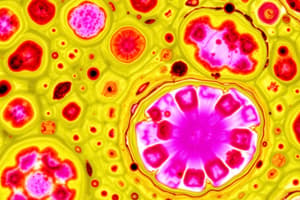Podcast
Questions and Answers
Which type of tissue primarily forms the covering or lining of body surfaces?
Which type of tissue primarily forms the covering or lining of body surfaces?
- Connective tissue
- Muscular tissue
- Epithelial tissue (correct)
- Nervous tissue
What is a key characteristic of epithelial tissue?
What is a key characteristic of epithelial tissue?
- It is highly vascularized.
- It primarily facilitates movement.
- It is always stratified.
- It can regenerate. (correct)
What type of epithelial tissue consists of a single cell layer?
What type of epithelial tissue consists of a single cell layer?
- Simple epithelium (correct)
- Stratified epithelium
- Pseudostratified epithelium
- Transitional epithelium
Which type of epithelium is involved in secretion in the body?
Which type of epithelium is involved in secretion in the body?
In which type of epithelium would you find cells with different heights, appearing stratified but actually being a single layer?
In which type of epithelium would you find cells with different heights, appearing stratified but actually being a single layer?
Which classification of epithelial tissue functions primarily in protection against injury?
Which classification of epithelial tissue functions primarily in protection against injury?
What shape best describes cuboidal epithelial cells?
What shape best describes cuboidal epithelial cells?
Which component is NOT a function of epithelial tissue?
Which component is NOT a function of epithelial tissue?
What type of epithelial tissue lines the air sacs of the lungs?
What type of epithelial tissue lines the air sacs of the lungs?
Which type of epithelium is characterized by cilia along its free surface?
Which type of epithelium is characterized by cilia along its free surface?
What function does simple cuboidal epithelium primarily serve?
What function does simple cuboidal epithelium primarily serve?
Which of the following is NOT a type of stratified epithelial tissue?
Which of the following is NOT a type of stratified epithelial tissue?
What is a primary characteristic of keratinized stratified squamous epithelium?
What is a primary characteristic of keratinized stratified squamous epithelium?
What is the main role of stratified epithelial tissue?
What is the main role of stratified epithelial tissue?
Which type of epithelium is found lining the female uterine tubes?
Which type of epithelium is found lining the female uterine tubes?
Which of the following epithelium types is well adapted to withstand abrasion?
Which of the following epithelium types is well adapted to withstand abrasion?
Flashcards are hidden until you start studying
Study Notes
Tissues Overview
- Tissues are groups of similar cells performing specific functions.
- Four fundamental types in the animal body:
- Epithelial tissue: covers and lines body surfaces.
- Connective tissue: supports and binds other tissues.
- Muscular tissue: facilitates body movement.
- Nervous tissue: transmits stimuli.
Epithelial Tissue (Epithelium)
- Composed of closely packed cells on a basement membrane.
- Lines all body surfaces and cavities, both internal and external.
- Avascular (lacks blood vessels) and capable of rapid regeneration.
Functions of Epithelial Tissue
- Protection: skin acts as a barrier.
- Secretion: salivary glands produce necessary fluids.
- Absorption: occurs in the small intestine.
- Excretion: sweat glands remove waste products.
- Sensation: taste buds detect flavors.
- Reproduction: plays a role in ovaries and testes.
Types of Epithelium
- Covering/Lining Epithelium: Forms sheets covering organs or lining cavities (e.g., skin, stomach lining).
- Glandular Epithelium: Comprises exocrine and endocrine glands.
Classification of Epithelial Tissue
-
By Cell Layers:
- Simple: one cell layer.
- Stratified: more than two layers.
- Pseudostratified: one layer with varying cell heights.
- Transitional: varying layers specifically in certain organs.
-
By Cell Shape:
- Squamous: flat, thin cells.
- Cuboidal: cube-shaped cells, equal height and width.
- Columnar: tall, slender cells.
-
By Function:
- Protective: safeguards against injury and infections.
- Sensory: responsible for receiving stimuli.
- Germinal: produces sex cells.
- Glandular: secretes substances for bodily functions.
Simple Epithelial Tissue
- Characterized by a single cell layer, optimized for functions like diffusion and secretion.
- Types:
- Simple squamous: flat cells, lines air sacs of lungs, blood vessels, and body cavities.
- Simple cuboidal: cube-shaped cells found in ducts and tubules, such as salivary glands and kidneys.
- Simple columnar: lines digestive organs, contains goblet cells for mucus secretion.
- Simple ciliated columnar: cilia aid in moving substances, found in uterine tubes.
- Pseudostratified ciliated columnar: appears layered but is not; present in respiratory tracts.
Stratified Epithelial Tissue
- Comprises multiple layers, primarily protective and thick.
- Types:
- Stratified squamous:
- Keratinized: outer skin layer, waterproof, protects against bacteria.
- Non-keratinized: moist lining of oral cavity, vagina, and anal canal.
- Stratified cuboidal: limited in distribution, lines ducts of glands (sweat, salivary, pancreas).
- Stratified squamous:
Studying That Suits You
Use AI to generate personalized quizzes and flashcards to suit your learning preferences.




